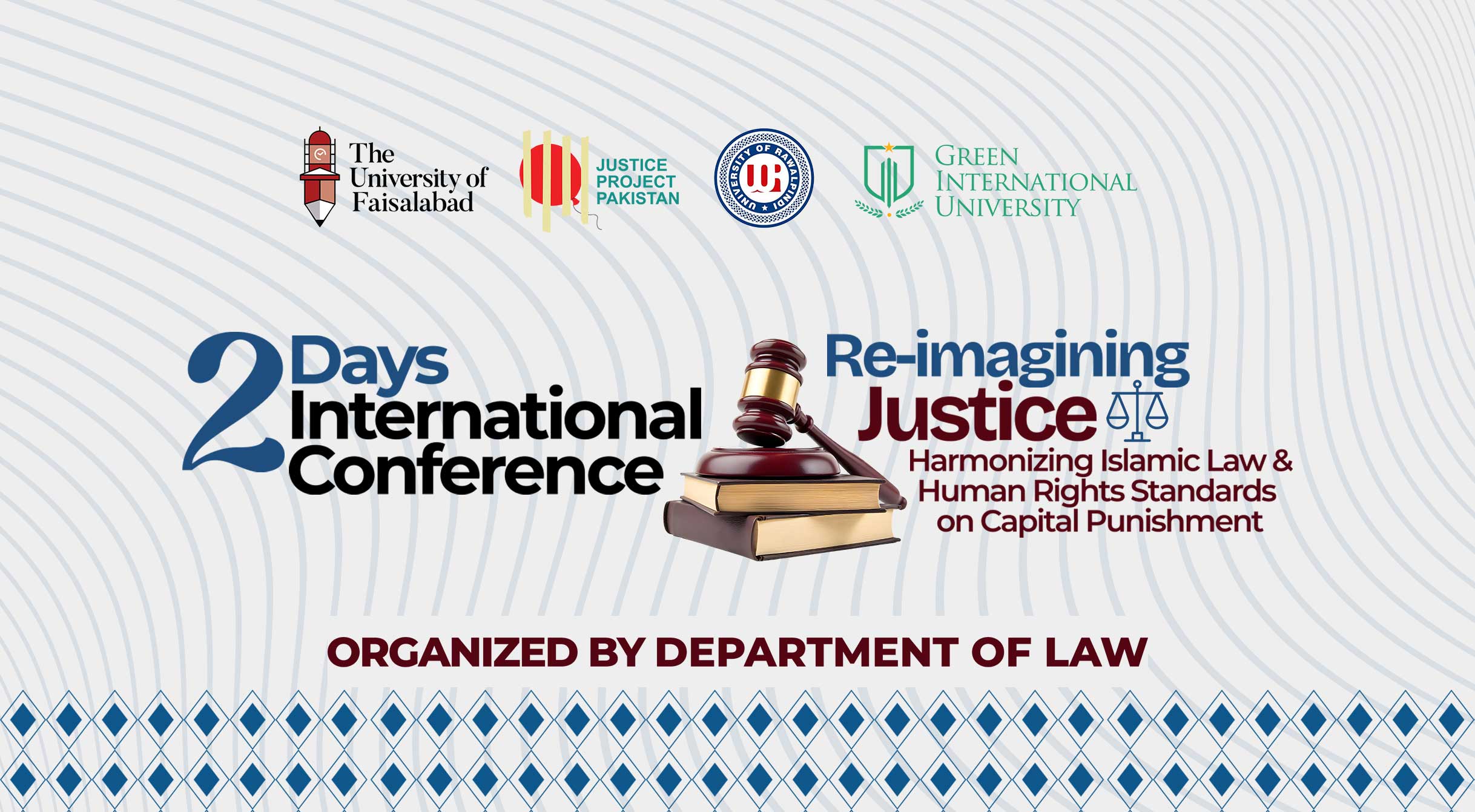Reimagining Justice: Pakistan Hosts First International Conference on Islamic Law and Human Rights in Capital Punishment
Introduction
Pakistan achieved a historic milestone by hosting the first International Conference on “Reimagining Justice: Harmonizing Islamic Law and International Human Rights Standards on Capital Punishment.” This significant event took place from October 21 to 22, 2025, organized collaboratively by The University of Faisalabad (TUF), Justice Project Pakistan (JPP), Green International University, and University of Rawalpindi.
The conference brought together an exceptional group of legal scholars, human rights advocates, judges, students, and international experts to engage in a critical dialogue about how Islamic jurisprudence and modern human rights frameworks can intersect to form a more humane and equitable justice system.
Significance of the Conference
This landmark conference marked a turning point in Pakistan’s academic and legal landscape. It was the first dedicated platform for examining the compatibility between Islamic law and international human rights standards, particularly in the sensitive area of capital punishment.
The event underscored Pakistan’s growing commitment to judicial transparency, ethical justice, and human dignity. By convening experts from diverse legal traditions, the conference aimed to explore ways to ensure fairness and compassion within a system guided by both faith and universal human rights principles.
Opening Ceremony and Welcome Addresses
The conference commenced with an inspiring opening ceremony.
- Prof Dr Aman Ullah Malik, Rector of The University of Faisalabad, highlighted the importance of merging traditional Islamic thought with modern human rights frameworks to achieve a fairer system of justice.
- Barrister Sarah Belal, Executive Director of Justice Project Pakistan, delivered a thought-provoking address emphasizing the need to transform research and policy into tangible reforms.
- Prof Dr Muhammad Mushtaq Ahmad, in his keynote speech, examined the theological, ethical, and legal dimensions of the death penalty in Islam, encouraging a shift toward restorative justice and mercy.
Their speeches set the tone for two days of intense intellectual exchange, critical reflection, and cross-cultural understanding.
Core Themes and Discussion Pillars
The conference explored six major thematic areas designed to deepen the understanding of how justice can be reimagined through an Islamic and human-rights-based lens.
1. Islamic Jurisprudence and the Death Penalty
Scholars revisited classical Islamic teachings related to capital punishment. Discussions focused on the principles of Qisas (retribution), Diyat (compensation), and Ta’zir (discretionary punishment), assessing how these can coexist with modern notions of justice and mercy.
2. Pakistan’s Legal Framework and Procedural Challenges
Experts examined Pakistan’s current legislative and judicial procedures surrounding capital punishment. The need for fair trials, access to defense, and the prevention of wrongful executions was emphasized. Participants called for reforms to ensure that justice remains restorative rather than purely retributive.
3. International Human Rights Standards
Sessions analyzed global human rights obligations, including the International Covenant on Civil and Political Rights (ICCPR) and UN guidelines on fair trial standards. Discussions centered on aligning domestic laws with international commitments to ensure the protection of life and dignity.
4. Comparative Perspectives Across Muslim-Majority Countries
Presenters highlighted reform models from other Islamic nations such as Malaysia, Morocco, and Indonesia, where traditional Islamic jurisprudence has been harmonized with human rights laws. These examples provided valuable insights for Pakistan’s path toward balanced legal reform.
5. Protecting Vulnerable Groups
Particular attention was given to vulnerable populations affected by the death penalty — juveniles, women, individuals with mental illness, and economically disadvantaged defendants. Participants stressed the moral and legal necessity of ensuring equitable treatment and enhanced procedural safeguards for these groups.
6. Advocacy, Litigation, and Social Awareness
The final sessions explored how advocacy and community engagement can drive change. Civil society representatives discussed the importance of grassroots awareness, media responsibility, and strategic litigation in promoting human rights-based reform.
Prominent Speakers and Participants
The event featured an impressive lineup of national and international experts, including:
- Justice (R) Khalil-ur-Rehman Ramday
- Prof Dr Qibla Ayaz
- Ms Ambika Satkunanathan
- Prof Dr Stefaan Smis
- Dr Mohammad Habbash
- Dr Inam Ullah
- Dr Sadiq Kakar
- Mr Farooq Ahsan
- Barrister Qasim Chowhan
- Dr Roop Zainab Rana
- Ms Denny LaBoeuf
- Ms Namra Gillani
The participation of law students, academics, and researchers from institutions across Pakistan — including Government College University Faisalabad, GCU Women University, and Faisalabad College of Law — made the conference a vibrant platform for exchange of ideas.
Key Takeaways
Several key messages emerged from the conference:
- Justice must be both lawful and compassionate. Capital punishment should reflect the spirit of mercy and fairness inherent in Islamic teachings.
- Judicial reform is essential. Pakistan’s legal institutions must ensure procedural fairness, prevent miscarriages of justice, and protect vulnerable individuals.
- Dialogue between Islamic and international law must continue. A deeper understanding between faith-based and rights-based systems can strengthen both frameworks.
- Academic collaboration matters. Universities play a vital role in promoting legal scholarship that bridges traditional and modern perspectives.
Broader Impact and Future Directions
The conference demonstrated that Islamic law and human rights are not inherently opposed; rather, they can complement each other when approached with intellectual openness and moral clarity. The discussions encouraged Pakistan to move toward a more rehabilitative and humane justice system.
By fostering collaboration between academia, legal practitioners, and human rights advocates, the event set the stage for long-term partnerships aimed at rethinking capital punishment within both national and global contexts.
Conclusion
The International Conference on Islamic Law and Human Rights in Capital Punishment stands as a milestone in Pakistan’s journey toward an enlightened and balanced justice system. It reaffirmed that the essence of justice in Islam—rooted in mercy, equality, and dignity—can harmoniously coexist with the principles of international human rights.
Through sustained dialogue, research, and reform, Pakistan can lead the Muslim world in demonstrating how faith-based jurisprudence and universal human rights can work together to uphold justice in its truest form.

